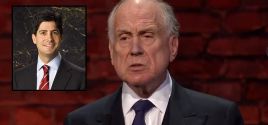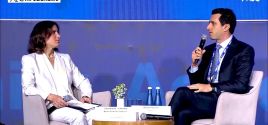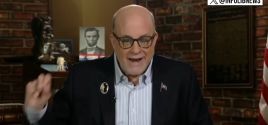The Hope of Freedom in the American Characterby Wendy McElroySep. 10, 2012 |
Popular 
Trump Expected to Pick Kevin Warsh, Son-in-Law of Zionist Billionaire Ron Lauder, as Fed Chair

New TikTok CEO Told World Jewish Congress How They Censored Criticism of 'Zionists'

Video Appears to Show Alex Pretti Spit at ICE, Kick Taillight Out of ICE Vehicle in Prior Confrontation

Israeli-American Council Asks Miriam Adelson and Haim Saban How They Control U.S. Politicians

Mark Levin Urges Trump to Strike Iran and Kill the Ayatollah and His Family
 It is the saddest quotation from classical liberalism. On the eve of World War I, British foreign secretary Sir Edward Grey stated, "The lamps are going out all over Europe. We shall not see them lit again in our time." The lamps or lights were freedom and peace. Grey did not see them again. Today the lights are going out all over America. Many people are sick at heart about the future of freedom, and understandably so. But there is no need to live in darkness. Freedom is not an external flame or circumstance that is beyond individual control; it is internal and the natural state of man. Many people realize that government does not create wealth but they still believe it creates freedom. And, so, when freedom becomes scarce, people look almost automatically to government to restore or create it. They agitate for a law, they vote for their candidate, they sign a petition. As with wealth, however, the government can only confiscate freedom, not grant it. Ultimately, all appeals to authority amount to pleading for less to be taken…or for the return of a portion of what was stolen before. Appeals to government are prevalent in America where the myth of being "the freest nation in the world" is tied to its political system. For example, the Founding Fathers are credited with establishing a free nation as though freedom did not exist before the Constitution. In reality, the Founding Fathers were remarkable not because they created liberty but because they usurped so little of the liberty that already existed. Even the Bill of Rights did not establish freedom; no piece of paper can. The Bill of Rights recognized the prior existence of specific freedoms such as free speech and, then, set up restrictions on how far the government could intrude upon them. The Bill of Rights said "leave the people alone in their freedom." And that is remarkable enough. Where does liberty come from? In his pivotal book Democracy in America (1835-1840), the classical liberal Alexis de Tocqueville marveled at the expansiveness of American freedom, especially when compared with Europe. He attributed this freedom to one phenomenon; namely, the American character. Two traits dominated this character: a zeal to join; and, a stubborn individualism. De Tocqueville called America a "nation of joiners." Whenever three Americans gathered in one place, associations and clubs seemed to spring forth. From construction crews to town hall meetings, from religious societies to fraternal organizations, Americans were driven to combine and improve society. They had a passion for civil society through which average people themselves conducted the business of living together with government rarely in evidence. At the same moment, an irrepressible spirit of independence and self-interest also drove the American character. Of this trait, de Tocqueville was critical. He wrote, "I see an innumerable multitude of men….Each of them withdrawn into himself, is almost unaware of the fate of the rest. Mankind, for him, consists in his children and his personal friends. As for the rest of his fellow citizens, they are near enough, but he does not notice them. He touches them but feels nothing. He exists in and for himself, and though he still may have a family, one can at least say that he has not got a fatherland." De Tocqueville was puzzled by the what he considered a contradiction: Americans were profoundly self-interested and, yet, they were a nation of joiners. He wrote, "There is perhaps no country on earth where one meets fewer idle people than in America, or where all who work are more passionately devoted to the quest for well-being….An American will attend to his private interests as though he were alone in the world, yet a moment later he will dedicate himself to the public's business as though he had forgotten them….The human heart cannot be divided this way. The inhabitants of the United States alternately exhibit a passion for well-being and a passion for liberty so strong and so similar that one can only believe that the two passions are conjoined and confounded somewhere in their souls." De Tocqueville embraced a false dichotomy. There is no contradiction between economic well-being and liberty. There is no tension between being active in a voluntary society and retaining your individuality. Indeed, the characteristics are two sides of the same coin. The more secure a man is in his personal sovereignty, the more goodwill he feels toward neighbors. He naturally reaches out to them to cooperate for the immense mutual advantages that civil society offers the individual. Indeed, civil society is the result of masses of people pursuing their own self-interest and, then, going home. This was the American character. Average people administered the business of society while remaining vigorously individualistic. And, so, the American was free. Today the business of society has been almost completely usurped by government so that no one can so much as buy a tomato without a license and payment of tax being involved. As people lose the ability to administer society so, too, do they lose personal liberty. The one-to-one correlation between the two is strong enough to be considered a cause-and-effect. Freedom needs nothing so much as Americans returning to character. The nation of joiners needs to join with each other instead of with government in order to resume the administration of civil society. At the same time and at every juncture possible, people need to privatize their own lives by removing government from their actions, attitudes and expectations. The lights of America will be lit again, one by one, by individuals who reclaim the business of society while privatizing their own lives. There is no need for darkness. _ Wendy McElroy is Author, lecturer, and freelance writer, and a senior associate of the Laissez Faire Club. |



